The Colic Survival Guide - Everything You Need to Know
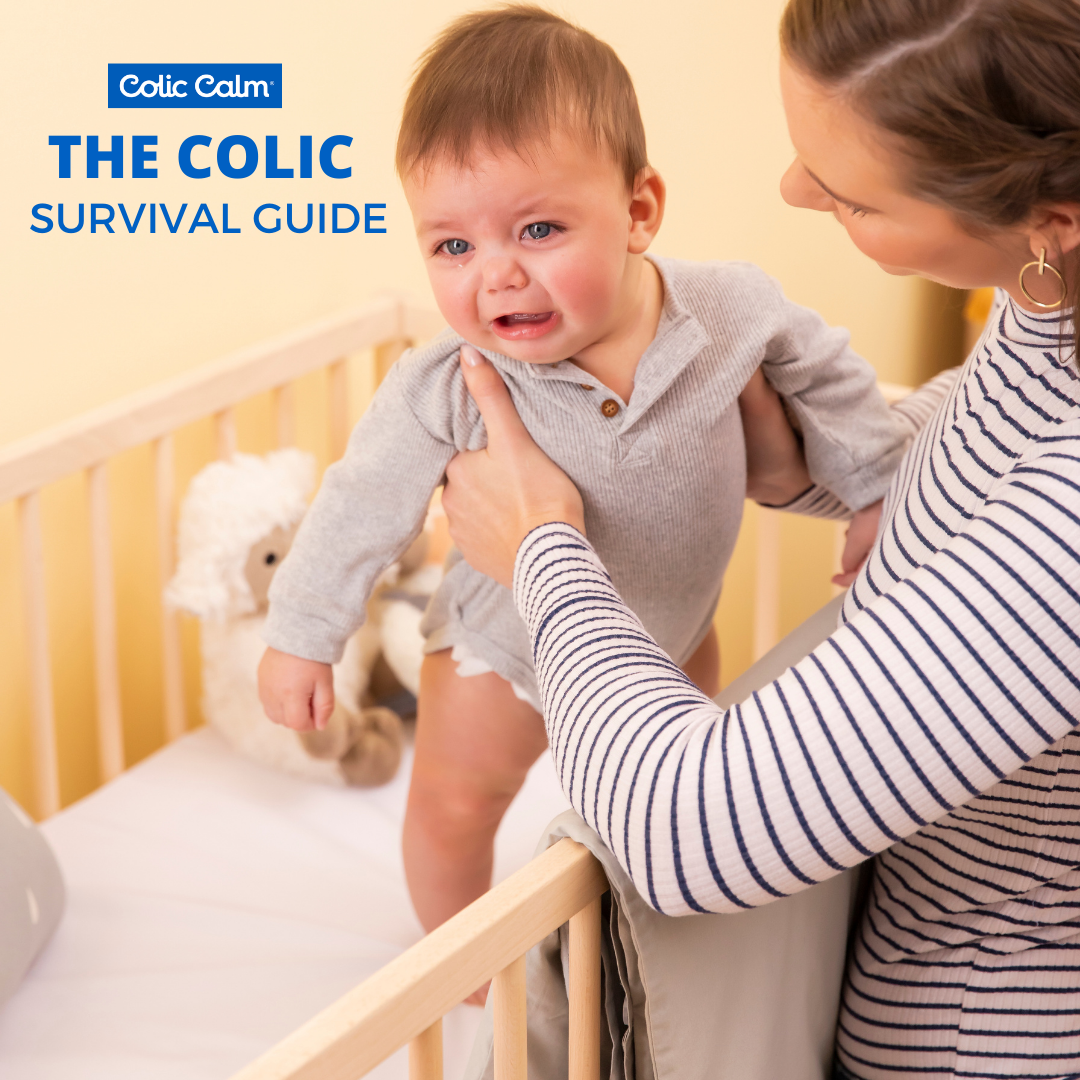
Colic can be extremely frustrating. It can seem like nothing works, even when you try everything to soothe your screaming baby. Your little one’s constant fussiness makes you feel an array of emotions – guilty, frustrated, angry and exhausted, just to name a few.
Though sometimes it feels like your world is falling apart during the colic days and weeks, there is hope. To aid you in getting through this time, we want to share with you our best tips and tricks to help you survive colic.
It’s Not Your Fault
When your baby is screaming and nothing works to soothe your little one, it can be easy to forget that you’re not the one to blame. Colic affects about 25% of babies and you didn’t do anything to exacerbate your little one’s colicky condition.
If you’re having trouble blaming yourself, take a step back and make a few changes like seeking out a supportive friend group. By simply joining a mom’s group, you increase the odds of being surrounded with people going through similar experiences. Since one in every four babies can be medically diagnosed with colic, the chances of meeting a fellow mom with a colicky baby are high. Better yet, you might meet woman who have already been through the colic phase and can offer valuable tips to ease your colic worries.
Understanding Colic
Truthfully, modern medicine has very few answers regarding colic and it is often misunderstood. Some doctors believe that nearly 20% of babies have colic, but there is no way to be 100% sure.
Colic may be caused by digestive spasms, over-sensitivity to stimulation, gas or hormones. There are many theories about colic, but there is no single consistent cause that experts can all agree on.
Some speculate that colic is caused by nutrient issues, such as food sensitivities and milk protein allergy. Others think that the external environment is to blame.
Trapped intestinal gas is often a usual culprit. 74% of parents we polled said that their baby displayed colic symptoms as well as signs of intestinal bloating. The majority also said that colic symptoms disappeared following bowel movements or passing gas.
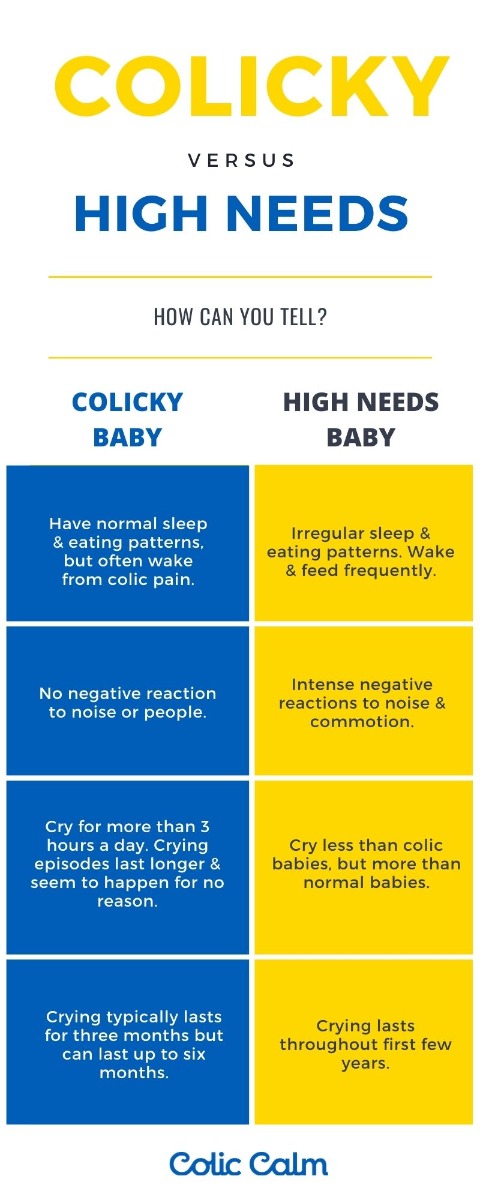
Identifying Colic
If you haven’t dealt with a colicky baby before, you may not know how to dentify colic. According to mayoclinic.org, “colic is frequent, prolonged and intense crying or fussiness in a healthy infant”. Colic symptoms start around two to four weeks of age, typically peak at six weeks of age and then decline drastically after three to four months of age.
It can be difficult to differentiate between a colicky baby versus a high needs baby. High needs babies typically have irregular sleep and eating patterns while colicky babies usually have normal sleeping and eating patterns but often wake up from colic pain. If your baby has a negative reaction to noise and commotion, it’s most likely a high needs issue.
Another thing to note is the amount of time your baby spends crying. Usually, your baby has colic if he or she cries for more than three hours a day, at least three days a week, for more than three weeks. This is known as “the Rule of Threes”. During these episodes, your little one may arch the back, pull the knees to the chest, clench fists and flail arms and legs. About 83% of the time, a colicky baby will also experience disrupted sleep patterns.
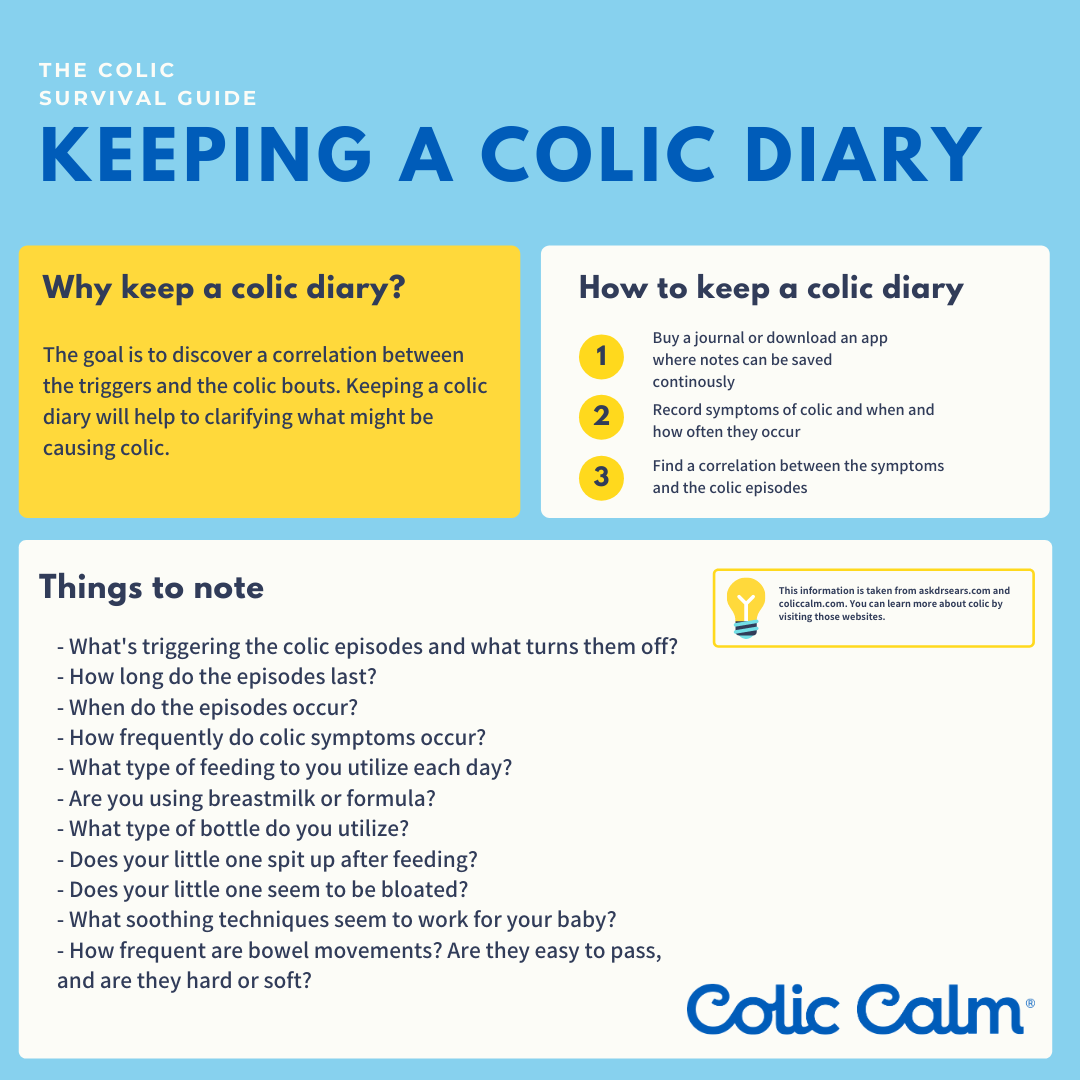
One of the most helpful ways to discover the cause of colic is to keep a colic diary. Tracking the length, time of day and triggers of symptoms will help you to draw a correlation between the cause and symptoms of colic in your baby. More specifically, you will want to record:
1. What's triggering the colic episodes and what turns them off?
2. How long do the episodes last?
3. When do the episodes occur?
4. How frequently do colic symptoms occur?
5. What type of feeding to you utilize each day?
6. Are you using breastmilk or formula?
7. What type of bottle do you utilize?
8. Does your little one spit up after feeding?
9. Does your little one seem to be bloated?
10. What soothing techniques seem to work for your baby?
11. How frequent are bowel movements? Are they easy to pass, and are they hard or soft?
It is also helpful to bring a colic diary to your baby’s doctor visit so that the physician can determine if your baby is dealing with colic or something else. Learn more about the causes, symptoms and treatment of infant colic here.
Coping with Colic
Dealing with colic can be devastating. However, there are several helpful ways to cope with colic. We’ve rounded up our best tips and tricks to give you the easiest colic experience as possible.
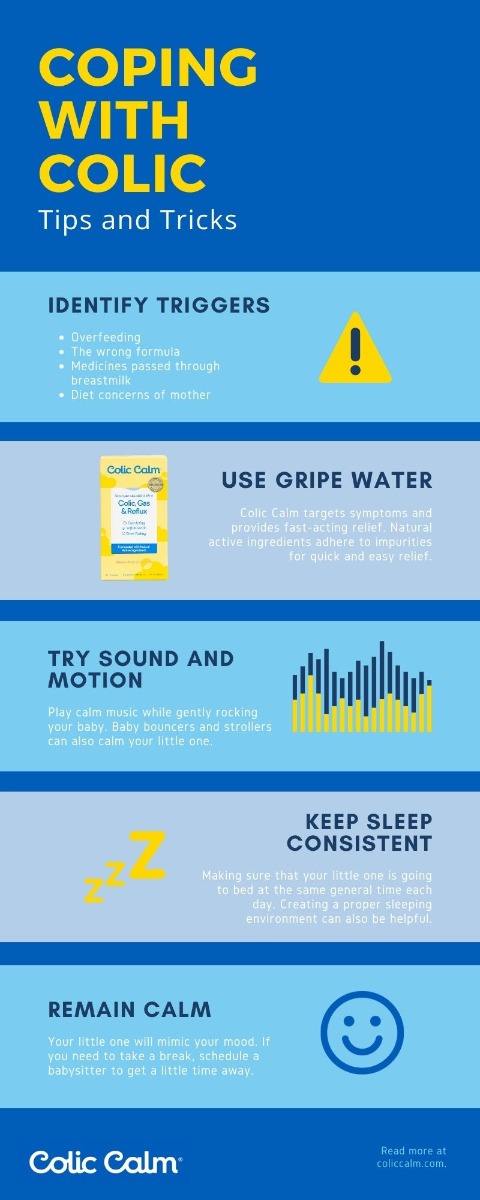
1. Identify triggers. Of course, it would be ideal to avoid colic in the first place. Identifying triggers of colic can be extremely helpful. A few common colic triggers are overfeeding, using the wrong formula, medicines passed from mom to baby through breastmilk and a mother’s diet. Try feeding your baby less and switching out the formula. If that doesn’t help, consult a doctor to talk about your medications and diet to see if that could be the culprit.
2. Use gripe water. Colic Calm works wonders by targeting colic symptoms and providing fast-acting relief using natural active ingredients. Unlike traditional gripe waters, Colic Calm’s natural active ingredients adhere to impurities in the digestive system and break them down in a quick and gentle way.
3. Try sound and motion. Play calm music while gently rocking your baby. White noise phone apps are perfect for this. Noise machines work great, too. In addition to the white noise, you may also want to sing to soothe your baby. The sound of your voice may settle your little one down. Rocking chairs and baby bouncers can help calm your little one. Pushing a stroller back and forth may also be a great option. You may even consider taking your baby on a car ride.
4. Keep consistent sleep patterns. Babies thrive from routines. Making sure that your little one is going to bed at the same general time each day. Even if they don’t completely fall asleep, setting the mood and creating a proper sleeping environment at the same time can be helpful.
5. Remain calm. Your little one will mimic your mood. If you’re stressed, it’s probable that your baby will also be stressed. If you need to, give yourself a break. Schedule a babysitter for a night out of the house with friends or ask if your parents or grandparents will watch your little one for a few hours. It’s totally healthy to take regular breaks!
Giving baby massages, warm baths and pacifiers are among the other various remedies for colic that you can try. You can also check out our “Tips & Remedies” page to discover more ways to cope with colic.
You’re Not Alone
Do you feel like your baby is the only baby that cries for hours on end? You might even feel like you’re on a “colic island” with no one understanding you. You might be surprised to know that about 25% or 1 out of every 4 babies worldwide meet the criteria for a medical diagnosis of colic. There are countless other mothers dealing with the same struggles as you, and chances are there’s a mom nearby that’s dealing with the same struggles.
Although it can be difficult to deal with, it’s important to remember that colic is not a long-term problem. Most of the time, babies are free from colic by four months of age. So, hang in there, mama! It gets better, we promise.
P.S. If you’re wondering exactly how long your little one’s colic will last, check out our Colic Duration Calculator at the bottom of this link.
Works Cited
https://www.mother.ly/child/a-parents-guide-to-surviving-colic
https://www.mayoclinic.org/diseases-conditions/colic/symptoms-causes/syc-20371074
 Canada
Canada South Africa
South Africa UK
UK EU & Int
EU & Int Ireland
Ireland Australia
Australia Brazil
Brazil New Zealand
New Zealand












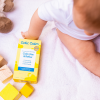





Comments